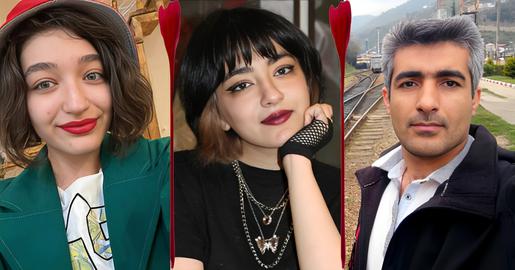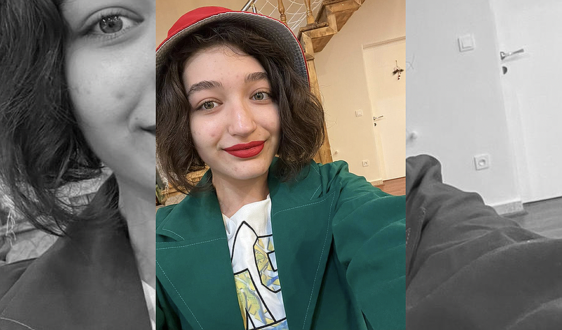Iranwire – was one of the bloodiest days of nationwide protests that followed the death in police custody of Mahsa Amini – a day during which between 45 to 55 people were killed by the security forces of the Islamic Republic. On the first anniversary of that bloody day, the Iranian government is systematically harassing the families of those victims of repression.

Audio clips, pictures and videos posted by Fatemeh Heydari, the sister of Javad Heydari, a protester killed by government forces, reveals a corner of the terror campaign against the grieving families of the victims of the crackdown on dissent.
***
In recent weeks, pressures on the families of those killed during protests sparked by the death of Mahsa Amini on September 16, 2022, has increased immensely as the anniversaries of the deaths of other victims near.
Security forces have pressured many of these families to abandon plans to mark the anniversaries of the deaths of their loved ones at their graves. They have arrested many family members, including Mahsa’s uncle Safa Aeli and the father, mother, sister and fiancé of Hananeh Kia, a 23-year-old woman who was shot dead on her way home from a dentist’s appointment on September 21, 2022.
House Arrest for Mahsa’s Father — Again
On the anniversary of Mahsa’s death on September 16, her family’s determination to hold a ceremony to mark her death led to the house arrest of her father Amjad Amini. According to IranWire sources, he was briefly arrested by security officers immediately after he left his residence in Mahsa’s hometown of Saqqez and taken back to his residence by the chief of the city’s Intelligence Department. He was instructed not to leave his home, which had been surrounded by security forces and plainclothesmen since the night before the anniversary.
On September 4, Mahsa’s uncle Safa Aeli was arrested.
Over the past month, some family members of victims have been arrested, especially those who have been very vocal in seeking justice for their loved ones, including the father and the sister of Mohammad Hassanzadeh, a young man who lost his life from multiple stab wounds and a bullet fired by government forces that struck his chest and heart during protests in the Kurdish city of Bukan. His father Ahmad and her sister Solmaz were arrested on September 5 and taken to an unknown location.
On August 23, Nasrin Alizadeh, the sister of Shirin Alizadeh, was arrested by security forces in Isfahan and taken to an unknown location. Earlier, Mohammad Vaziri, Shirin’s husband, was arrested in the same city. Shirin Alizadeh, 35, was killed in the Caspian Sea resort town of Ramsar on September 22, 2022, while she was in a car with her husband and their seven-year-old son.
On the same day, the Twitter account of 1500tasvir, which covers human rights in Iran, reported that Mahsa Yazdani, the mother of Mohammad Javad Zahedi, a 20-year-old who was killed on September 21, 2022, was arrested and taken to an unknown location. She had rejected the false narrative put forward by the government according to which his son had been “martyred” by opponents of the Islamic Republic.
On September 5, Farzad Moazami, the elder brother of Reza Moazami Goodarzi, a teenager who was killed during the November 2019 protests, was also arrested in the city of Borujerd in the western province of Lorestan.
On September 17, Fahimeh Moradi, mother of Yalda Agha-Fazli, was arrested at her home in Tehran. Earlier, her father reported that threats against the family had increased. Yalda, 19, who was arrested on October 26 in Enghelab Square in Tehran and released 10 days later without being informed of the charges against her, took her own life a few days after her release.
On September 15, Danial Aghili, a 20-year-old protester who was tortured while in custody last year and brutally attacked by plainclothes officers in August, was rearrested in Tehran. Aghili was first arrested on October 11, 2022. He was writing graffiti in support of the protests when armed forces tackled him to the ground, put a knife in his pocket and took pictures of him with Molotov cocktails.
The young man was released from prison on bail on January 24 and summoned to the Evin courthouse on August 26. After he refused to sign a letter of commitment pledging not to participate in commemorations marking the first anniversary of Mahsa Amini’s death, he was followed by two individuals who knocked him off his motorcycle.
Photographs and documents provided to IranWire depict extensive injuries to the right side of Aghili’s face, including severe scratches and damage to his eye. A source said that he sustained fractures to his skull and jawbone.
On September 21, Nasrin Shakarami, whose 16-year-old daughter Nika Shakarami became a symbol of the nationwide unrest, said she had been forced to call off a vigil. “I do not want participants to get hurt,” she wrote on Instagram, adding that she must think of the safety of her other daughter Aida.
Four days after Mahsa Amini died, Nika was filmed at a protest in Tehran setting fire to her headscarf, while other protesters chanted “death to the dictator.” Nika disappeared that evening after telling a friend she was being chased by the police. Her family found her body at a mortuary 10 days later.
The Islamic Republic’s Nightmare: Justice Seekers
“Anybody slightly related to the victims’ families has been threatened and a number of them have been arrested,” a civil rights activist in Tehran, who shall remain anonymous for his safety, tells IranWire.
“In the past year, families who seek justice have received extensive support from the people,” he says. “The situation is no longer like in the 1980s or 2009. People have great respect for those killed during the protests and their families. In the neighborhoods, everyone treats these families with love and empathy, and they are attentive to them. This is the biggest defeat for a government that once called the cemetery of those executed in the 1980s the ‘Land of the Damned’.”
The cemetery mentioned by this activist is Khavaran Cemetery in southwest Tehran, where the Islamic Republic buried thousands of political prisoners and prisoners of conscience who were executed in the 1980s in unmarked graves, notably those who were executed during the mass executions in the summer of 1988.
According to this rights activist, this atmosphere of respect and solidarity for “unarmed people who are standing up to security agents armed to the teeth” has terrified the government of the Islamic Republic. In the past year, he says, every burial, every grave, every mourning ceremony and now every death anniversary has become a node of resistance.
Many times in the history of struggle against dictatorships, women, mothers and grieving families have succeeded in holding dictatorial governments to account by organizing to seek justice.
Mothers of the Plaza de Mayo, with their emblematic white scarves, were women who had lost their young children during the military dictatorship in Argentina. From 1976 to 1983, thousands of young opponents of the military government “disappeared,” but the determination and courage of these women kept their names and memories alive and eventually led to the trial of the junta in 1985.
Istanbul’s Saturday Mothers gathered every Saturday at noon for half an hour at Galatasaray Square to remind the world of the disappearances and political murders in Turkey during the military coup-era of the 1980s and the 1990s and demand justice.
In Iran, movements such as Khavaran Mothers and Mothers of Laleh Park succeeded in forcing the government of Islamic Republic to come clean about one of its biggest crimes. In his first press conference as president of the Islamic Republic in 2021, Ebrahim Raisi implicitly confessed to his role in the mass executions of political prisoners in the summer of 1988 and took pride in it. Without directly answering a question about the executions, he said: “If a legal expert, a judge or a prosecutor has defended the rights of the people and the security of the society, he must be lauded and encouraged for preserving the security of the people against assaults and threats.” Moreover, he said he was “proud” to have always defended human rights as a prosecutor and in other capacities.
“Tell the people not to leave us alone”
On September 22, a day after security agents attacked the native village of Javad Heydari and prevented his family from holding ceremonies marking the anniversary of his death by throwing teargas and wounding relatives, his sister Fatemeh posted the picture of a written conversation she had had with another member of her family.
“Delvan [one of the children in the family] said that ‘the policemen have come to set us on fire,’” wrote this member of the family. He has developed a fever. They were all very frightened…they were behind our door…tell people not to leave us alone.”
The civil activist who spoke with IranWire and who himself was arrested during the protests and sentenced to prison says that not leaving these families alone is the only way to counter a government that has used everything at its disposal to harass them.
“This atmosphere of terror that they have created around the victims’ families has worsened but it is not something new,” he says. “They have done this before and they want to prevent people’s solidarity with these families and this is their weak point.”
“The Islamic Republic knows how dear to people are those who were killed in the protests and is extremely afraid of the memorial services organized for them, and that is why it is trying to prevent these ceremonies from being repeated. However, they are going to fail if people are present, even if only on social media. We must show the families that they are not alone and they will not be alone.”
 Shabtabnews In this dark night, I have lost my way – Arise from a corner, oh you the star of guidance.
Shabtabnews In this dark night, I have lost my way – Arise from a corner, oh you the star of guidance.



